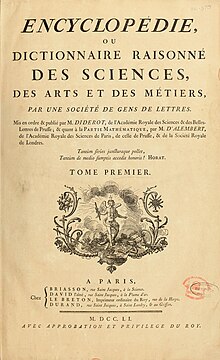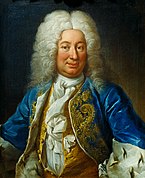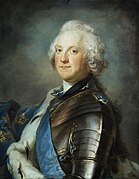1751
| Millennium: | 2nd millennium |
|---|---|
| Centuries: | |
| Decades: | |
| Years: |
|
April 5: King Frederik of Sweden dies, King Adolf Frederik becomes new ruler
| 1751 by topic |
|---|
| Arts and science |
|
| Countries |
| Lists of leaders |
|
| Birth and death categories |
| Establishments and disestablishments categories |
| Works category |
| 161 before ROC 民前161年 | |
| Nanakshahi calendar | 283 |
| Thai solar calendar | 2293–2294 |
| Tibetan calendar | 阳金马年 (male Iron-Horse) 1877 or 1496 or 724 — to — 阴金羊年 (female Iron-Goat) 1878 or 1497 or 725 |
Wikimedia Commons has media related to 1751.

1751 (
British Calendar Act of 1751
, which ended the year on 31 December (rather than nearly three months later according to its previous rule).
Events
January–March
- January 1 – As the Province of Georgia undergoes the transition from a trustee-operated territory to a Crown colony, the prohibition against slavery is lifted by the Trustees for the Establishment of the Colony of Georgia in America. At the time, the Black population of Georgia is approximately 400 people, who had been kept in slavery in violation of the law.[1] By 1790, the enslaved population of Georgia increases to over 29,000 and to 462,000 by 1860.[2]
- January 7 – The University of Pennsylvania, conceived 12 years earlier by Benjamin Franklin and its other trustees to provide non-denominational higher education "to train young people for leadership in business, government and public service".[3] rather than for the ministry, holds its first classes as "The Academy and Charitable School in the Province of Pennsylvania" in Philadelphia.[4]
- January 13 – For the first time, the American colony in Georgia has an elected legislature after having been administered by a corporate Board of Trustees since its founding in 1732. The original Georgia Assembly meets in Savannah with 16 representatives as the colony prepares to become a British colonial province.[5] After electing Francis Harris as the Speaker of the unicameral Assembly, the delegates successfully ask the Trustees not to surrender control of Georgia to the neighboring Province of South Carolina.[6]
- January 18 – In the aftermath of the Lhasa riot of 1750, Chinese General Ban Di arrives at the capital of Tibet on behalf of the Qianlong Emperor and the seven imprisoned leaders of the rebellion are turned over to his custody by the 7th Dalai Lama, Keizang Gyatzo. General Ban Di guides the interrogation under torture of rebel leader Lobsang Trashi and, after five days orders the beheading and dismemberment of the seven rebels.[7]
- Subhadar Muzaffar Jang, leads an invasion of cavalry against the small kingdom of Kurnool and is confronted by its monarch, the Nawab Bahadur Khan. The Subhadar and the Nawab order their soldiers to stand down and then engage in hand-to-hand combat, during which the Nawab "thrust[s] a spear into the Subhadar's brain" before he is "himself hacked to pieces."[8]
- February 16 – English poet Thomas Gray first publishes Elegy Written in a Country Churchyard, anonymously in The Magazine of Magazines. The poem becomes more popularly known as "Gray's Elegy".[9]
- Marquis de Vaudreuil, issues the first police regulations for New Orleans in an attempt to combat crime in that city.[10]
- March 25 – For the last time, New Year's Day is legally on March 25, in England and Wales and "in all his Majesty's Dominions in Europe, Asia, Africa and America"[11] due to the Calendar (New Style) Act 1750. The months of January 1751, February 1751 and most of March 1751 did not exist in British territories: those months were recorded as the last three of 1750 according to the Old Style dating system; the equivalent months a year later were recorded as the first three of 1752 under the New Style system.
- Augusta of Saxe-Gotha becomes Dowager Princess of Wales.
April–June
- Prince Adolf Frederick of the House of Holstein-Gottorp, who had been elected as the crown prince in 1743, becomes the new King.
- April 19 – the Qianlong Emperor of China visits the southern capital of Nanjing for the first time, bringing with him 3,000 staff and 6,690 horses and stays for four days [13]
- April 20 – A month after the death of his father, 12-year old Prince George William Frederick is formally invested as the new Prince of Wales[14] Nine years later, Prince George becomes King George III upon the death of his grandfather, King George II.
- April 29 – The sport of cricket is first played in the American colonies, as a team of New Yorkers plays against a team of Englishmen and defeats them, 167 to 80, in a match in Greenwich Village [15] [16]
- May 11 – The Pennsylvania Hospital, first hospital in the American colonies, is chartered in Philadelphia by the Pennsylvania legislature, which grants the right to Benjamin Franklin and to Dr. Thomas Bond. [17]
- 1 January legally New Year's Day from 1752 in the British Empire.[12][18] It is largely promoted by George Parker, 2nd Earl of Macclesfield.
- June 14 – The colony of South Carolina reverses a 10-year-old law that had imposed a tax of 100 pounds sterling on the purchase of imported African slaves, and reduces the tax to £10.[19] The move effectively restores the slave trade to the colony.
- June 28 – The first volume of Denis Diderot's Encyclopédie, ou dictionnaire raisonné des sciences, des arts et des métiers, often referred to as le Encyclopédie, is published [20] [21]
July–September
- Erekle II.
- July 31 – Fire destroys 1,000 houses in Stockholm.
- The Academy and College of Philadelphia, predecessor to the private University of Pennsylvania, opens its doors, with Benjamin Franklinas president.
- September 13 – Kalvária Banská Štiavnica in the Kingdom of Hungary is completed.
October–December
- October 22 – William V, Prince of Orange, the three-year-old son of the late William IV, becomes the last Stadtholder of the Dutch Republic. During his minority, his mother, Princess Anne, acts as regent until her death in 1759. Upon becoming of age in 1766, he will have a corrupt reign as the Republic's head of state until the office is abolished on February 23, 1785.
- October 27 – The Hōreki period begins in Japan.
- Trichinopoly (now Tiruchirappalli) in southern India is broken when the defenders use musket fire to force a stampede of the elephants of the French-backed troops of Chanda Sahib.[22]
- November 17
- Future United States President George Washington becomes seriously ill with smallpox while he and his older brother Lawrence are visiting the island of Barbados during an epidemic [23] Washington, 19 years old, survives the virus but is bedridden for almost a month.
- The Pima Revolt begins in the area that now includes the Mexican state of Sonora and the U.S. state of Arizona, as Pima Indian leader Luis Oacpicagigua carries out the massacre of 18 Spanish settlers at Oacpicagigua's home in Sáric. The rebellion, which takes the lives of more than 100 Spaniards, is ended on March 18 after Governor Diego Ortiz Parilla permits the rebels to surrender for imprisonment.[24]
- King of Sweden. The coronation ceremony takes place almost eight months after he assumed the throne.
- November 29 – The Cherokee nation signs a treaty with British colonial authorities at the close of the two-week Charlestown Conference in Charleston, South Carolina, with Governor James Glen signing an agreement with Cherokee war chiefs led by the "Old Skiagunsta" of Keowee, the Raven of Hiwasee, Old Caesar of Chatuga and Kittagusta of Joree.[25]
- British East India Company–led force under Robert Clive defeats and routs a much larger Franco-Indian army, under the command of Raza Sahib, at Arni.
- December 14 – The Theresian Military Academy is founded in Wiener Neustadt, Austria.
Date unknown
- In the University of Glasgow (Scotland):
- Adam Smith is appointed professor of logic.
- The Medical School is founded.
- Ferdinando Galiani publishes the first modern economic analysis, Della Moneta.
- Swedish naturalist Carl Linnaeus publishes his Philosophia Botanica, the first textbook of descriptive systematic botanical taxonomy, and the first appearance of his binomial nomenclature.
- The Maria Theresa thaler is minted; it becomes an international currency.[26]
- 1751–audiencias in the Spanish Empire are Creoles.
Births


- January 12 – Ferdinand I of the Two Sicilies (d. 1825)
- February 15 – Johann Heinrich Wilhelm Tischbein, German painter (d. 1829)
- February 20 – Johann Heinrich Voss, German poet (d. 1826)
- March 16 – James Madison, fourth President of the United States (d. 1836)
- April 5 – Marie-Aimée Lullin, Swiss entomologist (d. 1822)
- May 7 – Stephen Badlam, American artisan and military officer (d. 1815)[27]
- Charles Emmanuel IV of Savoy, King of Sardinia (d. 1819)
- June 4 – John Scott, 1st Earl of Eldon, Lord Chancellor of Great Britain (d. 1838)
- June 17 – Joshua Humphreys, American naval architect (d. 1838)
- July 11 – Caroline Matilda, British princess, queen consort of Denmark (d. 1775)
- July 29 – Elisabetta Caminèr Turra, Venetian writer (d. 1796)
- July 30 – Maria Anna Mozart ("Nannerl"), Austrian musician and composer, sister of Wolfgang Amadeus Mozart (d. 1829)
- September 1 – Emanuel Schikaneder, German dramatist, actor and singer (d. 1812)
- September 5 – François Joseph Westermann, French Revolutionary leader, general (d. 1794)
- October 30 – Richard Brinsley Sheridan, Irish dramatist, politician (d. 1816)
- date unknown
- Armand-Marie-Jacques de Chastenet, Marquis of Puységur, French mesmerist (d. 1825)
- Gregoria Apaza, Bolivian indigenous leader (d. 1782)
- Charlotta Richardy, Swedish industrialist (d. 1831)
- Thomas Sheraton, English furniture designer (d. 1806)
- Maria Antonia Fernandez, Spanish flamenco singer, dancer (d. 1787)
Deaths



- January 17 – Tomaso Albinoni, Italian composer (b. 1671)
- January 20 – John Hervey, 1st Earl of Bristol, English politician (b. 1665)
- January 25 – Paul Dudley, Massachusetts Attorney-General (b. 1675)
- January 29 – Martin Knutzen, German philosopher (b. 1713)
- February 5 – Henri François d'Aguesseau, Chancellor of France (b. 1668)
- February 7 – Albert Borgard, Danish artillery and engineer officer (b. 1659)
- March 21 – Johann Heinrich Zedler, German publisher (b. 1706)
- March 24 – János Pálffy, Hungarian field marshal, Palatine (b. 1664)
- March 25 – King Frederick I of Sweden (b. 1676)
- March 29 – Thomas Coram, English sea captain, philanthropist (b. c. 1668)
- March 31 – Frederick, Prince of Wales, Hanoverian-born heir to the British throne (b. 1707)
- April 19 – Peter Lacy, Irish-born Russian field marshal (b. 1678)
- Gisela Agnes of Anhalt-Köthen, Princess of Anhalt-Köthen by birth and by marriage Princess of Anhalt-Dessau (b. 1722)
- May 20 – Domènec Terradellas, Spanish opera composer (b. 1713)
- June 9 – John Machin, English mathematician (b. c.1686)
- Governor-General of the Dutch East Indies (1737–1741) (b. 1695)
- August 18 – Samuel von Schmettau, Prussian field marshal (b. 1684)
- August 22 – Andrew Gordon, British physicist (b. 1712)
- August 30 – Christopher Polhem, Swedish scientist (b. 1661)
- October 22 – William IV, Prince of Orange, Stadtholder of the Dutch Republic (b. 1711)[28]
- October 26 – Philip Doddridge, English nonconformist religious leader (b. 1702)
- November 18 – Abraham Vater, German anatomist (b. 1684)
- December 12 – Henry St John, 1st Viscount Bolingbroke, English statesman, philosopher (b. 1678)
- December 16 – Leopold II, Prince of Anhalt-Dessau, Prussian general (b. 1700)
- December 19 – Louise of Great Britain, queen of Frederick V of Denmark (b. 1724)
- December 29 – Charles, Count of Armagnac, French noble (b. 1684)
Notes
- ^ Scotland had already moved its New Year's Day from 25 March to 1 January, with effect from 1 January 1600
References
- ^ James Van Horn Melton, Religion, Community, and Slavery on the Colonial Southern Frontier (Cambridge University Press, 2015) p. 232
- ^ Charles E. Cobb Jr., On the Road to Freedom: A Guided Tour of the Civil Rights Trail (Algonquin Books, 2008) p. 156
- ^ "Penn's Heritage", University of Pennsylvania website
- ^ Edward Potts Cheyney, History of the University of Pennsylvania, 1740–1940 (University of Pennsylvania Press, 2014) p. 37
- ^ Craig A. Doherty and Katherine M. Doherty, The Thirteen Colonies: Georgia (Infobase Publishing, 2005) p. 64
- ^ Edward J. Cashin, Beloved Bethesda: A History of George Whitefield's Home for Boys, 1740–2000 (Mercer University Press, 2001) p. 67
- ^ Yingcong Dai, The Sichuan Frontier and Tibet: Imperial Strategy in the Early Qing (University of Washington Press, 2009) p. 131
- ^ N. S. Ramaswami, Political History of Carnatic Under the Nawabs (Abhinav Publications, 1984) pp145-146
- ^ Catherine Robson, Heart Beats: Everyday Life and the Memorized Poem (Princeton University Press, 2012) p134
- ^ Troy Taylor, Wicked New Orleans: The Dark Side of the Big Easy (Arcadia Publishing, 2010)
- ^ "Saturday's Post from the Whitehall and General Evening Posts", The Derby Mercury (Derby, Derbyshire), September 15, 1752, p. 1
- ^ ISBN 0-304-35730-8.
- ^ Chuck Wooldridge, City of Virtues: Nanjing in an Age of Utopian Visions (University of Washington Press, 2015) p25
- ^ Notes and Queries: A Medium of Intercommunication for Literary Men, General Readers, Etc., April 21, 1894 (Oxford University Press, 1894_ p314
- ^ John Thorn, Baseball in the Garden of Eden: The Secret History of the Early Game (Simon and Schuster, 2012) p64
- ^ Tom Melville, The Tented Field: A History of Cricket in America (Popular Press, 1998) p5
- ^ Thomas G. Morton and Frank Woodbury, The History of the Pennsylvania Hospital, 1751-1895 (Philadelphia Times Printing House, 1895) p376
- ISBN 0-9515497-2-3.
- ^ Joseph Kelly, America's Longest Siege: Charleston, Slavery, and the Slow March Toward Civil War (The Overlook Press, 2013)
- ^ Jean Le Rond d'Alembert, Preliminary Discourse to the Encyclopedia of Diderot (University of Chicago Press, 1995) pp xxviii
- ^ Sam Stark, Diderot: French Philosopher and Father of the Encyclopedia (The Rosen Publishing Group, 2005)
- ^ Micheal Clodfelter, ed., Warfare and Armed Conflicts: A Statistical Encyclopedia of Casualty and Other Figures, 1492–2015 (McFarland, 2017) p110
- ^ Elizabeth A. Fenn, Pox Americana: The Great Smallpox Epidemic of 1775-82 (Macmillan, 2002) p14
- ^ Thomas E. Sheridan, Empire of Sand: The Seri Indians and the Struggle for Spanish Sonora, 1645-1803 (University of Arizona Press, 1999) p178
- ^ David H. Corkran, The Cherokee Frontier: Conflict and Survival, 1740–62 (University of Oklahoma Press, 2016) pp32-33
- ISBN 0-9549701-0-1.
- ^ Nash, Susan Higginson (January 26, 1958). "Badlam Famed Dorchester Cabinet Maker". Boston Herald. p. 7.
- ^ "William IV | prince of Orange and Nassau". Encyclopedia Britannica. Retrieved August 23, 2020.


